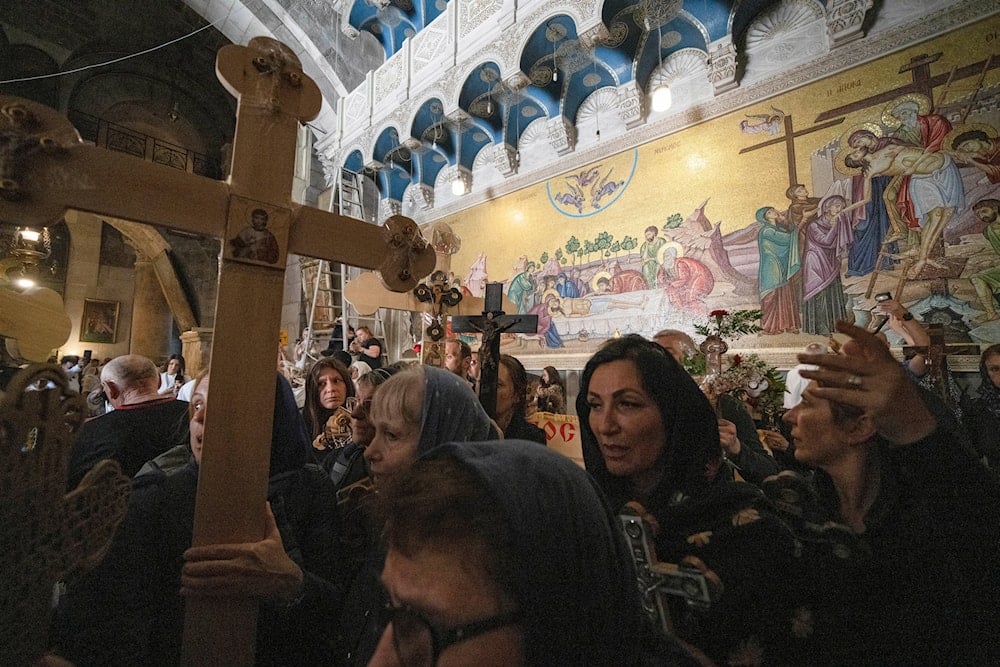Palestinian churches body decries Israeli taxation on al-Quds churches
The Higher Presidential Committee for Church Affairs in Palestine says the taxation policy is designed to pressure the indigenous Christian presence and forcefully displace it.
-

Orthodox Christians walk the Way of the Cross procession that commemorates Jesus Christ's crucifixion on Good Friday, inside the Church of the Holy Sepulchre in the Old City of occupied al-Quds, May 3, 2024. (AP)
The Higher Presidential Committee for Church Affairs in Palestine has declared its firm rejection of the Israeli occupation's imposition of taxes on churches and their properties in the occupied Palestinian territories.
In a statement released on Thursday, the committee affirmed its support for the decisions made by church patriarchs and leaders in confronting these measures.
The committee highlighted that the systematic Israeli policies and procedures aimed at imposing taxes on churches and their properties and institutions in occupied al-Quds are designed to pressure the indigenous Christian presence and forcefully displace it.
These measures also aim to exert full control over these churches and their properties, particularly as some Israeli municipalities have filed official claims in courts against many churches, the statement added.
The committee reiterated the principled and steadfast positions of the church patriarchs and leaders who reject these unlawful measures. It emphasized its support for all decisions made to counter these Israeli policies and procedures.
The committee also warned of the severe implications of implementing these Israeli plans, particularly on the Christian presence, amid the challenges and difficulties faced by the Palestinian cause due to Israeli policies, the ongoing war on Gaza, and the escalating violence against churches and their properties, including assaults on clergy by Israeli settler groups.
Furthermore, the committee affirmed that all churches and their properties, including monasteries, hospitals, institutions, and schools, especially in occupied al-Quds, are situated on occupied Palestinian land according to international legitimacy resolutions. These properties are also considered a historical and legal right of the churches, and no entity has the right to interfere with or violate their sanctity.
The statement added that the Israeli occupation, throughout its prolonged occupation and successive governments, has continuously violated and attacked the status quo agreement, which preserves the rights of all religious sects and communities in occupied al-Quds.
In the conclusion of the statement, the committee called on church leaders worldwide, especially the World Council of Churches, and all human rights and international organizations to intervene immediately to put an end to Israeli violations against churches and their properties.
It is noteworthy that Christians in the occupied Palestinian territories, like all Palestinians, suffer from violations and harassment and are deprived of performing their religious rituals. Their holy sites are subject to desecration and violations by settlers and occupation forces.
'Israel' attacking al-Quds Christians
"In this time, when the whole world, and the Christian world in particular, are constantly following the events in Israel, we find ourselves, once again, dealing with an attempt by authorities to drive the Christian presence out of the Holy Land," the heads of the Catholic and Orthodox churches wrote in a letter to Israeli occupation Prime Minister Benjamin Netanyahu.
This comes as the heads of the Catholic, Greek Orthodox, and Armenian Orthodox denominations have accused the Israeli occupation of a "coordinated attack" on the Christian presence in al-Quds due to the decision, by several municipalities, such as Tel Aviv, Ramla, al-Nassira, and al-Quds, to tax church properties and threatening legal action following failure to do so.
“We believe these efforts represent a coordinated attack on the Christian presence in the Holy Land,” the church leaders wrote.
Church leaders contend that the policy change, which involves taxing their properties, breaks with the longstanding tradition of exemption, an action that will impact the status quo. They further argued that even commercial properties owned by the church should not be taxed since the proceeds support collective services such as schools, hospitals, and care facilities for the elderly and disabled.

 4 Min Read
4 Min Read










